A while back, a man sent me a question about how he should respond to his atheist son who has nothing but criticism for Christianity. He told me that he had read several books of apologetics, had used numerous arguments for the existence of God, and had tried to show his son all the important things that Christianity had done in the world over the past 2000 years.
Despite all the evidence for the existence of God and the arguments for the goodness of Christians, this man’s son was still not convinced, and remained an atheist. The son pointed out to the father all the hateful things that Christians said and did, as well as all the violent things that God commanded in the Bible. As a result, the son told his father that he could never believe in or follow a God like that or trust anyone who represented him.
This father wrote to me to see if I had any insight into what he could tell his son to show him how wrong he was.
There are two possible ways I could have answered him. First, there is this possible answer:
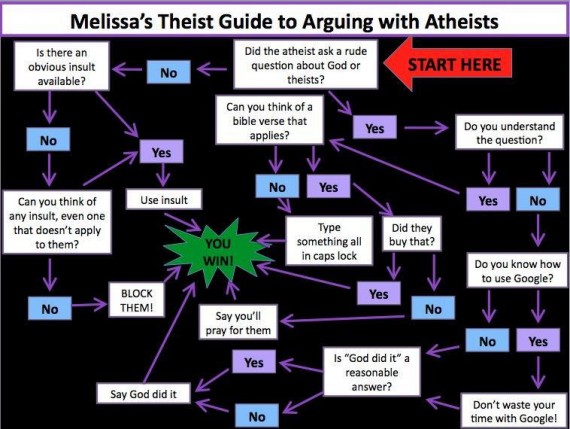
Somehow, I don’t think the flowchart above would help any atheist. Sadly, such a flowchart is the route many Christians choose to use when arguing with atheists.
So below is the edited and revised version of what I actually invited this Christian father to tell his atheist son:
My son,
You wrote about all the mean Christians you know, and how we have done and said so many hateful and hurtful things in history, and even in our own day.
You also wrote about all the violence in the Bible which was done in the name of God, and apparently by His command, and how abhorrent this appears to be.
Regarding these issues, I have only three words to say:
You are right.
You are right that there are lots of people all over the world and throughout time doing lots of horrible things in the name of Christianity.
And there is no point in me saying that all those people who are doing these evil things in the name of God are wrong, for they would probably say that I am wrong for disagreeing with what they do in God’s name.
So all I can do is agree with you.
Those hateful things should never have been said. Especially not when said “in the name of Jesus.”
Those hurtful deeds should never have been done. Especially not “in the name of Jesus.”
And while I do believe in God, I believe in the God revealed in Jesus, who looks nothing like the violent deity of the Old Testament. This doesn’t mean that I don’t believe in the Old Testament; I do. I just think something different is going on in those ancient texts than what most Christians assume. But whatever the Old Testament texts teach, they do not and should not give Christians a license to act like the devil in the name of God.
Here is what I believe:
I believe that Jesus called us to love people unconditionally.
I believe that any time anybody claims to follow Jesus but they do not love people, they are not following Jesus.
I believe that if what I practice is true, then these practices will help me love others more.
Yes, I know that there are lots of “religious” things about Christianity with which you object. But please know that none of that is important if it doesn’t help me love others like Jesus.
If these other religious activities do not help me love others like Jesus, then I hope that one day I am able to weed them out of my life as you suggest and become more like you. If they don’t help me love others, then they probably aren’t true. And If they do help me love others, I hope you will be able to see it in my life by how I treat others.
I love you,
Dad
I do not think that what I wrote will help this man’s atheistic son become a Christian, but it will certainly help the father live more like a Christian.
And that’s the point, isn’t it?
Christianity is not about proving others wrong, but about proving others are loved.
Do you have atheists friends or family members? I invite you to take a similar approach with them. Agree with our atheist critics! Admit and confess to the numerous places where Christians have got it wrong, and state that the only real goal of following Jesus is love.
If you do this, you may come to realize that maybe, just maybe, atheist are more in tune to the Holy Spirit than Christians are, and that maybe, just maybe, God is calling Christians to follow Him more closely through the prophetic voice of the atheist.





 It might look like my friend Sam Riviera, when he takes food, clothing, and a kind word to the homeless people on the streets of San Diego.
It might look like my friend Sam Riviera, when he takes food, clothing, and a kind word to the homeless people on the streets of San Diego.


 It is true that everything we need to know in life we learned in Kindergarten, and one of the main things we learned in Kindergarten was the importance of saying we’re sorry to others when we hurt them.
It is true that everything we need to know in life we learned in Kindergarten, and one of the main things we learned in Kindergarten was the importance of saying we’re sorry to others when we hurt them. 
 There are all sorts of ways of getting condemned as a heretic.
There are all sorts of ways of getting condemned as a heretic.
 But what makes the lack of love even more heretical, is that a lack of love often leads religious people to do horrendous and hurtful things “in the name of Jesus,” which makes these actions not just heretical, but satanic and evil.
But what makes the lack of love even more heretical, is that a lack of love often leads religious people to do horrendous and hurtful things “in the name of Jesus,” which makes these actions not just heretical, but satanic and evil.
 These keys are summarized by some quotes I heard from somewhere … (I cannot recall where or from whom … sorry).
These keys are summarized by some quotes I heard from somewhere … (I cannot recall where or from whom … sorry).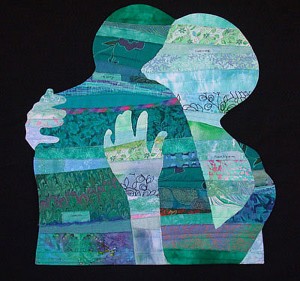 I think I might have heard this from
I think I might have heard this from 


 For all the mentions of human violence, references to divine violence appear almost twice as often.
For all the mentions of human violence, references to divine violence appear almost twice as often. Though innocent of any wrongdoing, God, in Jesus, let us blame Him for every wrongdoing.
Though innocent of any wrongdoing, God, in Jesus, let us blame Him for every wrongdoing.
 Over at the “
Over at the “
 Babies.
Babies.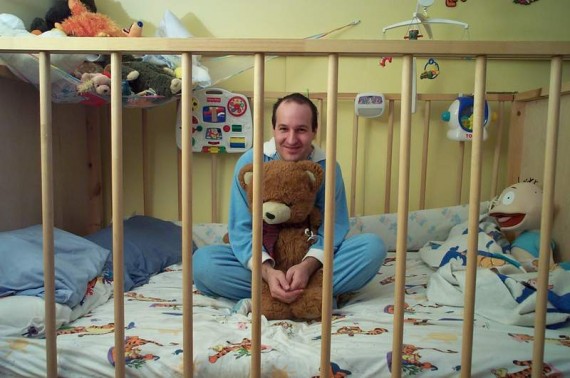
 Earlier I used a marriage as a metaphor, here’s another one: If you feel woefully out of shape physically, and once a week you attend a seminar on how to work out, or how to eat healthy, but then the rest of the week don’t live any different, can you complain about the seminars?
Earlier I used a marriage as a metaphor, here’s another one: If you feel woefully out of shape physically, and once a week you attend a seminar on how to work out, or how to eat healthy, but then the rest of the week don’t live any different, can you complain about the seminars?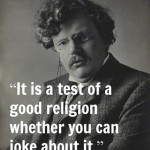
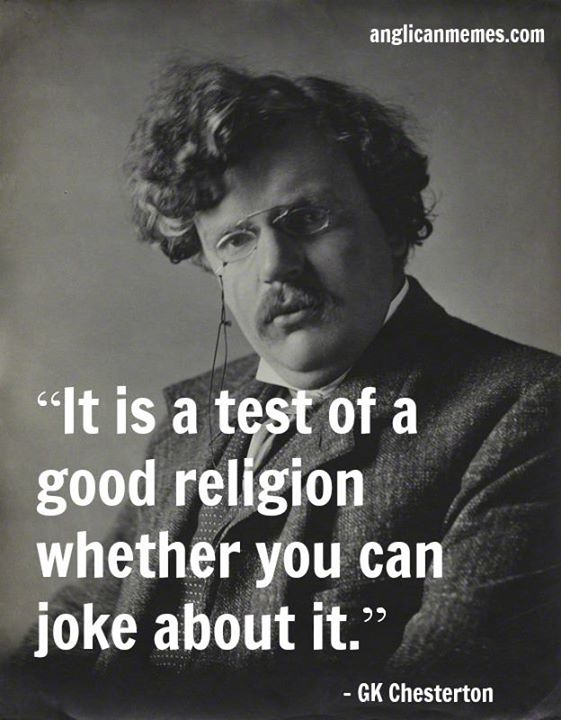

 We Christians owe the world an apology.
We Christians owe the world an apology. 
